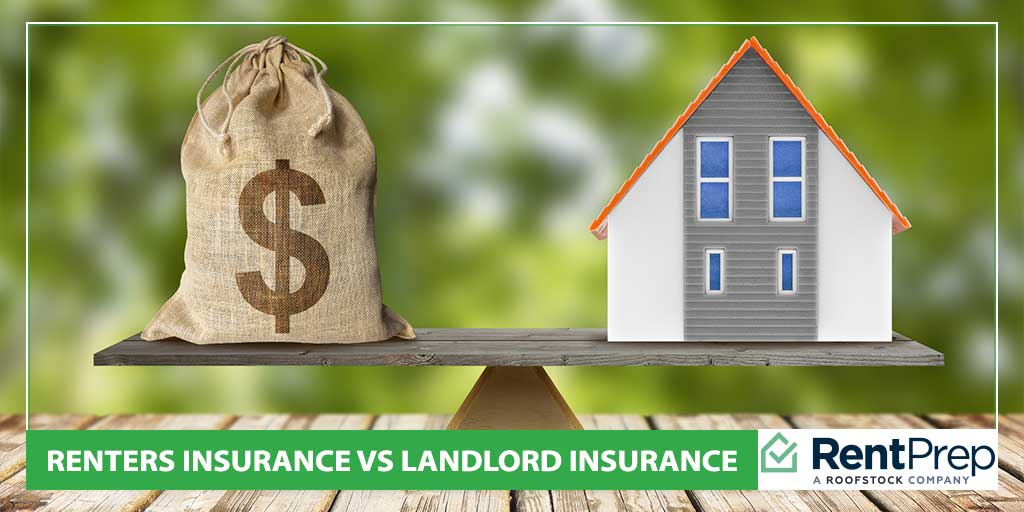
Renters insurance is used by tenants to ensure their property stays safe and they don’t owe for accidental damages; landlord insurance protects landlords from liability as well as unexpected costs related to their work.
Which one is more important: renters insurance vs landlord insurance?
If you’re a landlord, the answer should be “both.”
If you don’t know what the difference is between landlord insurance vs renters insurance (and why your best option is to ensure both are in place), you could end up in a tight situation down the line. Both of these insurance coverage options offer a lot of benefits for maintaining the long-term viability of your rental property, but there are important differences between them.
Let’s find out more about each of these insurance types, what is typically covered by each type of plan, and why you should be paying attention to both of them.
A Table Of Contents For Renters Insurance vs Landlord Insurance
- What Is Landlord Insurance And What Does It Cover?
- What Is Renters Insurance And What Does It Cover?
- Landlord Insurance vs Renters Insurance: Cost
- Landlord Insurance vs Renters Insurance: Coverage
- Landlord Insurance vs Renters Insurance: Liability
- Renters Insurance vs Landlord Insurance FAQs
What Is Landlord Insurance And What Does It Cover?

Let’s start by talking about the coverage you as a landlord would be buying if you were to buy extra coverage: landlord insurance.
Landlord insurance is an insurance policy that is taken out by the landlord to cover the property itself. If there is damage to the property through a fire, this type of policy would be used to cover the damages. Depending on the exact coverage type, it could also cover some of the contents of the rental.
Additionally, landlord insurance policies typically include some type of liability coverage for the landlord. The policy would act to protect the landlord if they were to be sued because of an incident at the property, and that liability protection is very important.
Without this type of protection, the landlord could be sued directly as an individual, and that could cause much bigger problems for everyone involved.
What Is Renters Insurance And What Does It Cover?
Renters insurance, on the other hand, is a type of insurance policy that is taken out by a tenant to cover specific aspects of their living situation. This type of insurance policy does not cover the property itself, as tenants do not own the building and cannot cover it.
Instead, renters insurance covers the cost of what you would need to pay to stay elsewhere if something were to happen to make the property uninhabitable. Additionally, these policies typically cover the personal property you have in the rental unit.
Finally, these policies usually include liability and defense coverage. These aspects protect you as an individual in case you end up getting sued or claimed against for an incident at the rental. For example, the policy might provide for the cost of your defense team if you are accused of starting a fire at the property through negligence.
Landlord Insurance vs Renters Insurance: Cost

The cost of both landlord insurance and renters insurance differs depending on a number of factors. Generally speaking, renters insurance tends to be less expensive because it doesn’t insure a complete building or structure as with landlord insurance.
Like all insurance, however, the cost is going to be different depending on who is taking out the policy, how comprehensive the policy is, and what other policies the individual has through the insurance company.
Based on all of these factors, the insurance company will offer a specific amount of coverage at a specific price. As with all insurance, it is a good idea to shop around to make sure you are getting the best balance of coverage and cost through the policy you select.
Landlord Insurance vs Renters Insurance: Coverage
When you boil down the differences in coverage between renters insurance vs landlord insurance, you can say that renters insurance covers what is inside of the property while landlord insurance covers the property itself.
Belongings
Legally, landlords cannot take out an insurance policy to cover the personal belongings of the tenant. In the same way, a tenant cannot legally take out an insurance policy to cover property that is owned by someone else, i.e. the rental they are staying in.
For that reason, there is no overlap in the actual items that are covered by the insurance policies, though there are times when the insurance may payout to cover damages to the property of the other individual.
Loss Of Use
Another aspect of coverage that differs between the two policies has to do with what happens if, for some reason, the property is no longer being occupied.
If something like a fire happens at the property and that causes the tenant to be unable to live in the property, the renters insurance would provide them funding so they can stay somewhere else.
On the flip side, if something occurs that would prevent you from being able to rent out the property temporarily, your landlord insurance policy would give you funding to cover those months of lost rent.
Loss of use affects both sides in different ways, so the insurance policies differ as well to cover these incidents.
Landlord Insurance vs Renters Insurance: Liability
Finally, let’s talk about the differences in liability to landlords insurance vs renters insurance. Liability coverage is often included in both policies, but what is the difference between the two?
Liability Coverage And Defense
Ultimately, the difference isn’t very extreme. Landlord insurance policies provide liability and defense coverage to landlords while renters insurance does the same for tenants.
There are situations where you or your tenant may find that they or their insurance company needs to file a claim against the opposite party. In these cases, the claim would be filed against the individual if there is no liability policy there for protection. That is why it is always advisable for both parties to have this type of protection in place.
There are even cases where both the tenant and landlord will need to defend themselves. If a third-party gets injured on an unshoveled sidewalk, for example, both parties are likely to have some type of liability, and their insurance policies would help cover that.
Medical Payouts
Another aspect of liability that both renters and landlord insurance tend to include are good-faith medical payouts for someone injured at the property.
If someone gets injured in a common area, for example, the landlord insurance is likely to agree to pay out a claim for that person. If someone gets injured within a rental because of the renter’s use of the property, the renters insurance is likely to payout for the medical coverage as well.
The specifics of how medical payouts and liability work for each policy type will, once again, depend on the specific coverage purchased.
Renters Insurance vs Landlord Insurance FAQs
What Type Of Insurance Is Renters And Landlord Insurance?
Renters and landlord insurance coverage plans are usually a combination of property insurance and liability insurance. Depending on the specific plan you purchase, you can expect your plan to include policies that help with both property damage and liability expenses in the case of an accident.
Are Renters Insurance And Homeowners Insurance The Same?
Renters insurance and homeowners insurance are not the same.
Renters insurance is a type of insurance held by tenants that is used to cover damage to their personal property; it does not cover the building since they do not own the building.
Homeowners insurance, on the other hand, is a type of property insurance that covers the structure of the home and any belongings owned by the homeowner inside of the property.
Homeowners insurance can only be held by the property owner while renters insurance can only be held by the tenant of a rental property.
How Much Insurance Do I Need On A Rental Property?
As a landlord, it is important that you protect your investment as much as possible; you should have at least the minimum coverage that includes property damage, liability up to $1 million, and loss of income coverage.
These three aspects are the most important for protecting your business and your future, so they are what you should make sure is included.
What Is The Best Insurance Company For Rental Properties?
Every insurance company offers something different, and the policies are going to vary based on your individual business as well as where you live. To find the best insurance company for rental properties in your area, it is best to compare policies and ask other landlords in the area what experiences they have had with the companies.
Can My Landlord Make Me Buy Renters Insurance?
In most states, a landlord can require their tenants to buy renters insurance. Oklahoma is a notable exception to this generalization, but most states and cities permit landlords to require this type of protection since it is to the benefit of the tenant to have the insurance.
What Is Not Covered In Renters Insurance?
While renters insurance covers many things, there are some circumstances where your tenants’ belongings may not be covered by their policies:
- Damage caused by natural disasters (if not included in policy)
- Damage caused by pests or vermin
- High-value items that need to individual insured
- Damage caused by war or terrorism
Of course, the specifics of what is or is not covered under the rental insurance that your tenant has is going to depend on their policy. Advise your tenant to look closely at their terms or contact their insurance company for more information.
How Much Is Renters Insurance Per Month For An Apartment?
According to a rate analysis by an insurance website, the average amount renters are paying for $40,000 of coverage is $27 a month. That being said, the amount that the policy costs can differ greatly depending on the amount of coverage you want to have and the other policies you carry with the same company.
How Does Renters Insurance Payout Work?
Renters insurance payouts usually work in one of two ways.
Under a cash payout policy, the policy will pay out the actual cash value of the item as it would be valued today. Under a replacement policy, the policy will pay for the cost of a replacement.
Because it can be much more expensive to buy replacements depending on the item, many replacement policies are more expensive than cash value policies.
Insurance: All Sides Should Have Protection
We are of the opinion that the best way to ensure that all parties are protected is to encourage or require your tenants to have rental insurance while also carrying landlord insurance yourself.
If only one party has an insurance policy in place, the other half will be left out in the open if an accident should occur.
As you can see, when it comes to renters insurance vs landlord insurance, there isn’t a lot of overlap in what property or items are covered. For that reason, both parties should heavily consider getting coverage so that all parties are protected.

